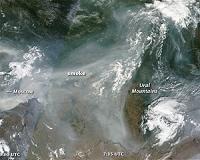 |
Washington DC (SPX) Aug 31, 2010 A study conducted by U.S. Forest Service and University of Washington (UW) scientists has found that fuel treatments-even of only a few acres-can reduce fire severity and protect older trees desirable for their timber, wildlife, and carbon-storage value. The finding is part of a three-year study of the 175,000-acre Tripod Fire and is published in the August issue of Canadian Journal of Forest Research. "This study provides the most definitive evidence yet of the effectiveness of fuel treatments in dry forests of the Pacific Northwest," said Susan Prichard, a UW research scientist and senior author of the study. "If dense forests are thinned and the surface fuels are removed, then ponderosa pine and Douglas-fir trees have a better chance of surviving an intense wildfire." Prichard and her Forest Service colleagues quantified tree mortality on the Okanogan-Wenatchee National Forest in an area affected by the 2006 Tripod Fire, which burned through forested areas managed to reduce potential fire hazard. Because of the management history of the area, the researchers were able to compare untreated stands, stands that were thinned, and stands that were thinned and then underwent prescribed burns to remove surface fuels. Results of the comparison revealed that the Tripod Complex fires killed over 80% of trees in stands without treatment and in stands with thinning only. Nearly 60% of trees survived in stands with thinning plus fuel treatment, and three-quarters of larger trees-those with diameters larger than 8 inches-survived. "It's all about fuels-dead fuels on the ground add energy to wildfire and carry it across the landscape and dense stands of live trees and shrubs act as fuel ladders, moving fire into the canopy," said Dave Peterson, a research biologist with the Forest Service's Pacific Northwest Research Station who coauthored the study. "The objective of fuel treatments is not to eliminate wildfires, but to reduce their intensity in areas where we want to protect resources." If, as expected, a warmer climate causes an increase in wildfire in future decades, conducting fuel treatments in forest ecosystems will be an important tool for reducing damage from fire and increasing resilience to climate change. "If we implement treatments across large areas and place them strategically, we can manage these low-elevation forests sustainably, even in a warmer climate," Peterson said.
Share This Article With Planet Earth
Related Links USDA Forest Service, Pacific Northwest Research Station Forest and Wild Fires - News, Science and Technology
 Russia lifts fire emergency in three regions, weather cools
Russia lifts fire emergency in three regions, weather coolsMoscow (AFP) Aug 20, 2010 Russia on Friday reported further success in containing the fires that ravaged the country for weeks as temperatures in Moscow plunged to 10 degrees Celsius, following its worst ever heatwave. "President (Dmitry Medvedev) has ordered the lifting of the state of emergency in the Nizhny Novgorod and Moscow regions as well as Mordovia," the Kremlin said in a statement. The situation in Nizh ... read more |
|
| The content herein, unless otherwise known to be public domain, are Copyright 1995-2010 - SpaceDaily. AFP and UPI Wire Stories are copyright Agence France-Presse and United Press International. ESA Portal Reports are copyright European Space Agency. All NASA sourced material is public domain. Additional copyrights may apply in whole or part to other bona fide parties. Advertising does not imply endorsement,agreement or approval of any opinions, statements or information provided by SpaceDaily on any Web page published or hosted by SpaceDaily. Privacy Statement |